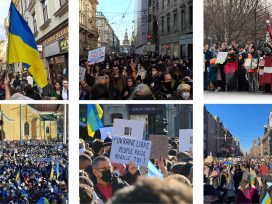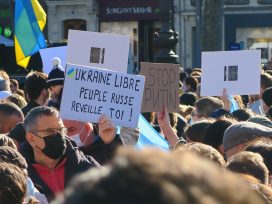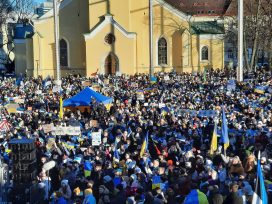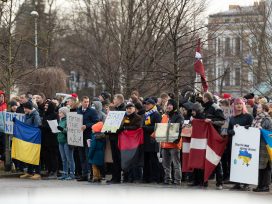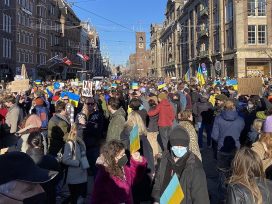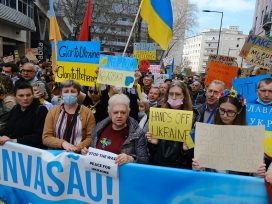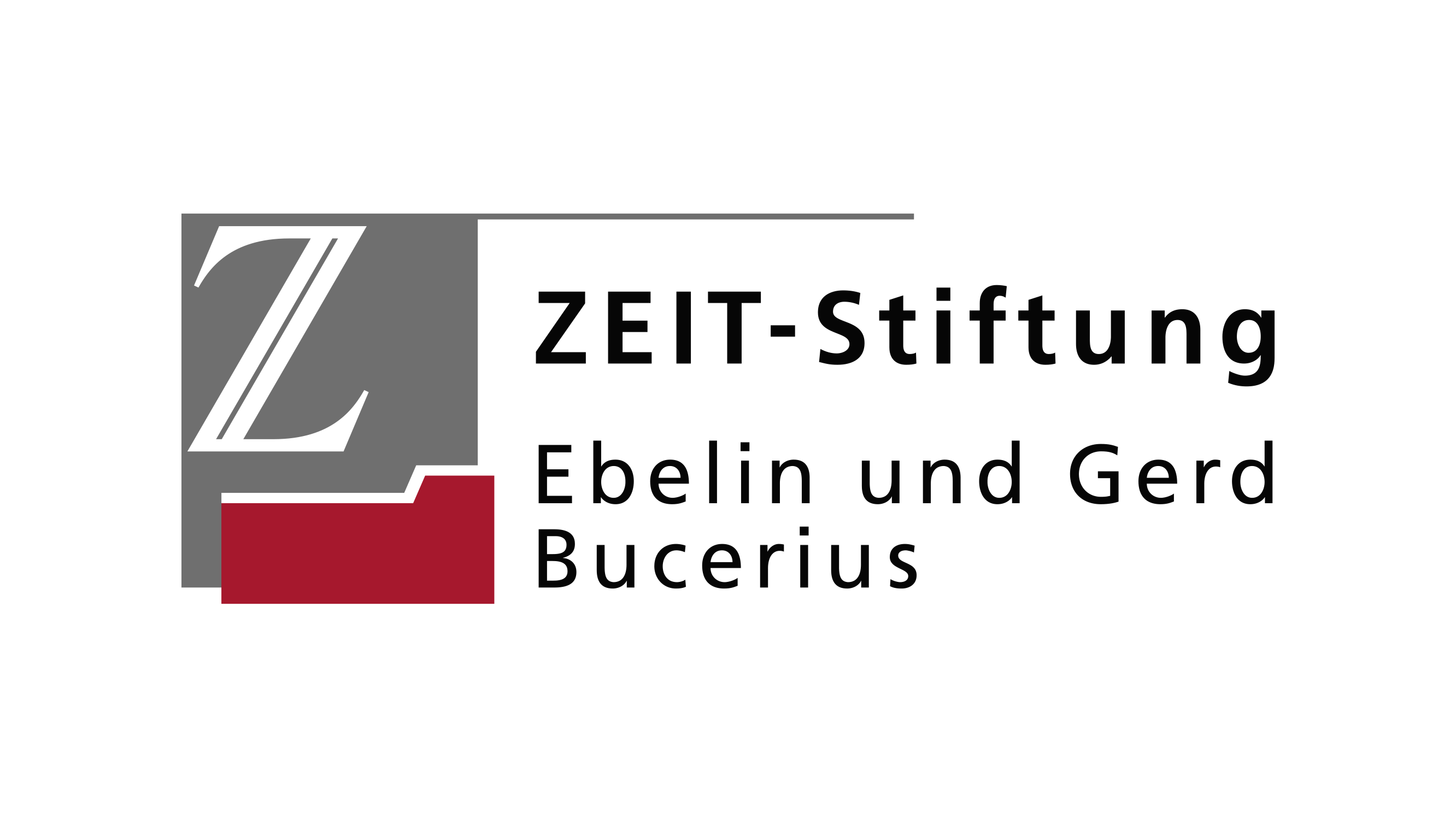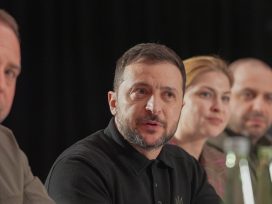Ukraine: Europe’s greatest test
The Russian attack on Ukraine has plunged Europe into a security crisis. So far the reaction has been united. But quick-fix defence spending is one thing, a long-term strategic response quite another. Part of the series ‘Lessons of war: The rebirth of Europe revisited.’
The French diplomat and one of the founding fathers of the post-war European order, Jean Monnet, wrote in his memoirs that ‘Europe will be forged in crisis and will be the sum of the solutions it will find to these crises’. In 1976, when those words were published, and in the decades that followed, Monnet’s prediction resonated more with Europe’s past than with its present. The European project was born from the ashes of the most devastating crises on the continent: totalitarianism and two world wars. The solution to those crises – the pooling of coal and steel production between former enemies – was the origin of the European integration journey.
The Coal and Steel Community and the ensuing European Economic Community, the European Community and the European Union had other, less edifying, purposes too, including a soft landing for Europe’s crumbling empires in the throes of decolonization. However, this does not alter the fact that European integration was also, even principally, a way to ensure that world war would never happen again.
Sure enough, from the 1970s to the early 2000s, Europe’s evolution seemed to follow another logic. The development of the single market, monetary union and the Schengen area could hardly be characterized as solutions to crises. If anything, enlargements were aimed at seizing opportunities, ranging from the democratization of southern Europe in the 1980s, to the prosperity accrued by the northern enlargement of the 1990s, to the reunification of Europe in the 2000s after the end of the Cold War.
During this time, rather than a solution to crises, the ‘Monnet method’ became associated with functionalist theories that saw (political) integration as the natural telos of technical and economic cooperation. European countries increasingly grappled with challenges impossible to overcome without involving supranational institutions. The ‘crises’ to which the EEC, EC and eventually the EU were the solutions were not truly crises, but policy problems best addressed through integration.
Monnet’s dictum only returned to its true meaning many years later. Since the mid-2000s, the EU has been mired in real crises: the 2005 Constitutional Treaty crisis, the 2008 global financial crisis that spilled into the Eurozone crisis in 2011–13, the 2015 migration crisis, the 2016 Brexit referendum and the danger this would trigger a domino effect, then the pandemic and, finally, Russia’s invasion of Ukraine. Each of these crises endangered the survival of the European project by causing paralysis, distrust, division and loss of solidarity.In each of these crises, Monnet was put to the test. In cases such as the migration crisis, the result was failure, as the EU made little headway in building a common asylum and migration policy. In other cases, the Union scraped through, exiting the Eurozone crisis by means of a half-baked banking union. In other cases, like the pandemic, it passed with flying colours, laying the foundations of a health union and, above all, creating a nascent fiscal union through the NextGenerationEU plan.
Today war rages on the European continent again. Russia’s invasion of Ukraine poses the most deadly threat to European security since the Second World War. As the EU reacts politically, economically and in terms of energy policy, security and defence, is Monnet’s principle standing the test? If so, what does this tell us about the rebirth of Europe?
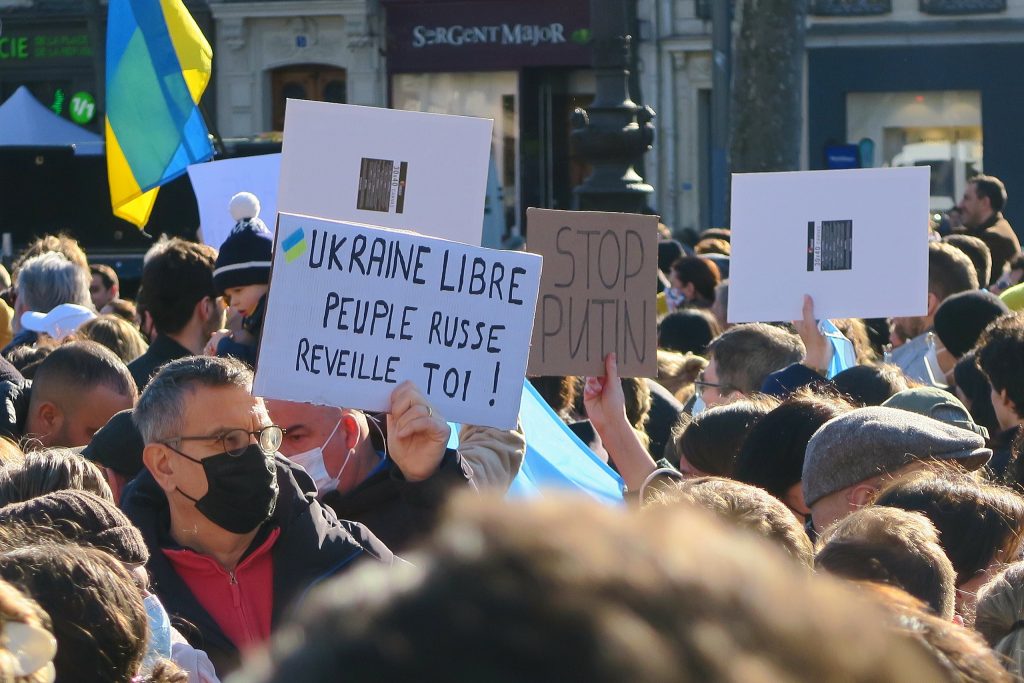
Paris, 26 Feb 2022. Paola Breizh, CC BY 2.0, via Wikimedia Commons
End of an illusion
Despite Russia traditionally being one of the most divisive questions in Europe, the EU has mustered and maintained a united response. EU member states have unanimously agreed on 11 packages of sanctions on Russia, the most significant of which came in the early months of the war. Subsequently, measures slowed down: after sanctioning finance, technology, coal and oil, seizing public and private assets, banning responsible individuals, capping energy prices, and reducing the import of Russian gas to a trickle, there is little left to sanction. The focus is now on closing loopholes and tightening the screws of implementation.
Throughout this period, some disagreements have surfaced and remain to be ironed out. However, as regards the most politically toxic case – Victor Orbán’s Hungary – the Union has developed ways to contain the damage. Orbán’s manoeuvrings have broadly failed, with the European Commission using a novel form of economic conditionality linked to the rule of law. In December 2022, the Commission held back €22 billion in cohesion funds for Hungary until it respects principles related to judicial independence, academic freedom, LGBTQI rights and the asylum system.
To date, the EU stands politically united vis-à-vis the war in Ukraine. Divisions have not grown. In fact, they have narrowed. In the early months of the war, some western European countries – notably France – triggered the ire of northern and eastern Europeans by insisting on negotiations and on not humiliating Putin. But there are few in Berlin, Paris or Rome who now believe in the potential for negotiations, ceasefire, let alone a peace agreement with Russia.
This unity is not limited to the EU. Russia’s invasion of Ukraine has put the poisonous post-Brexit EU–UK relationship on a different footing; it has ushered unparalleled transatlantic unity, notwithstanding acute differences over trade and industrial policy; and it has gelled cohesion within the G7 and other like-minded countries such as Australia and South Korea.
The contrast between Europe’s response to the war in Ukraine and other wars in the past could not be starker. Exactly twenty years ago, in 2003, the world was shaken by a war launched by another nuclear superpower: the US-led invasion of Iraq. The shockwaves of that war can still be felt across the Middle East. At the international level, the Iraq war will probably be remembered as the beginning of the end of the ‘pax Americana’ and US global hegemony.
Like Russia’s invasion of Ukraine, the US-led invasion of Iraq was illegal and justified by lies: in Iraq, the existence of weapons of mass destruction, in Ukraine, imminent NATO expansion and a Nazi regime. And, like Russia, the US was aiming at regime change – although not at permanently occupying and annexing Iraqi territory.
However, in contrast to Russia’s invasion of Ukraine, the US invasion of Iraq divided and paralysed the EU. The Union was split between France and Germany, which led the opposition against the war, and the UK, Italy and Spain, which supported it. The divide spilled over beyond western Europe. Just as the central eastern European countries, having signed the Accession Treaty, were readying to enter the EU the following year, US Secretary of Defence Donald Rumsfeld spoke of a divide between ‘old’ and ‘new’ Europe, the latter standing with the US.
European publics, especially in western Europe, were aghast at the abuse of American power and mobilized in their millions across European capitals. The protests prompted the German and French philosophers Jürgen Habermas and Jacques Derrida to advocate for a European public space, articulating a European vision in which – in contrast to the US neocon model – soft power, multilateralism and international law would prevail over hard power, unilateralism and the notion that might makes right.
Two decades later, the lesson drawn from Russia’s invasion of Ukraine is diametrically opposite. The war has reminded Europeans they do not live on Venus, as American scholar Bob Kagan mocked two decades ago. Though we may not live on Mars either, we do live on planet Earth, which is a dangerous place.
The war has swept away the dream, and perhaps the illusion, of a free and open space from Lisbon to Vladivostok, in which soft power, multilateral institutions and international law would represent the foundations of shared security. The ambition to build a European security architecture together with Russia has been ended by the hard truth that, at least for the time being, European security needs to be built against the Russian threat.
Europe’s strategic moment
This has led to three major conclusions for Europe, all of which contrast sharply with those drawn in the wake of the Iraq war. First, the enlargement of the EU (and NATO) has returned to the European strategic agenda. In 2003, the decision to enlarge had already been taken. It materialized one year later and was completed in 2007 with the entry of Bulgaria and Romania. After that, enlargement practically ground to a halt. Except for Croatia in 2013, no country has entered the EU for almost two decades.
The accession process continued formally in the case of the Western Balkans and Turkey but became characterized by a double farce: candidate countries pretended to reform, and the EU pretended to integrate them. The outcome was predictable: democracy and rule of law faltered, economic development languished, peace processes stalled, and Russia and China muscled in.
But the Union was too absorbed by its successive existential crises to pay attention. Especially when democracy and rule of law began backsliding in Hungary and Poland, many in western Europe silently started believing that perhaps eastern enlargement had been a mistake after all.
The illusion that ‘old Europe’ could turn in on itself and ignore the turmoil beyond its borders was shattered by Russia’s invasion of Ukraine. Suddenly, it became obvious that stability, while guaranteed within the EU and NATO, could not be taken for granted on the other side of the ‘frontier’.
Unsurprisingly, Ukrainian president Volodymyr Zelensky applied for EU membership three days into Russia’s full-scale invasion of his country. Now, Ukraine and Moldova are recognized as candidate countries, while Georgia is a potential candidate. In the Western Balkans, Albania and North Macedonia have recently opened accession negotiations. Bosnia-Herzegovina has been recognized as a candidate, and the change of leadership in Podgorica could revamp momentum for enlargement in Montenegro.
All this does not amount yet to a revival of the EU’s accession policy, and plenty of problems remain to be solved, the most urgent of which is the dramatic deterioration of relations between long-term candidate Serbia and potential candidate Kosovo. Deep reforms await both countries. The EU, too, will need to renew its institutions, decision-making procedures and policies in key areas such as agriculture and cohesion. But it is becoming increasingly obvious that there is an extremely high cost to non-enlargement. The war has demonstrated that to maintain the status quo would be an intolerable risk for European security.
Second, as opposed to 2003, there is a growing conviction in Europe today that hard power matters. The war has driven up military budgets across Europe, from Germany’s €100 billion Zeitenwende to the more uneven uptick across mostly northern and east European states. EU member states’ defence spending is expected to grow by €70 billion over the next three years and thereby to finally approach NATO’s goal of 2% of GDP.
Having traditionally considered defence a dirty word, EU institutions have now mobilized a European Peace Facility to support the Ukrainian campaign and approved the largest training mission to date for the Ukrainian armed forces. As of March 2023, the EU and its members have collectively provided €12 billion in military assistance to Ukraine – and a total of €67 billion, including economic aid. The EU has also developed a mechanism for the procurement of ammunition for Ukraine, in May committing a first €2 billion tranche to the endeavour.
Finally, and paradoxically, whereas the 2003 war prompted Europeans to distance themselves from the US by shunning hard power, in 2023 Europe has become dramatically more dependent on Washington, while focusing more than ever before on becoming a credible defence player. In times of peace in Europe, European defence efforts would have been read as hard evidence of European strategic military autonomy in the making. In times of war, the opposite is true. Without US military support for Ukraine, Kyiv would have fallen, putting the entire European continent at unprecedented risk. And as Europeans deplete their stocks by sending weapons to Ukraine, they replace them with whatever is available: and this is more often American than European.
This does not mean that European military industrial projects have stalled altogether. However, in times of war, the bulk of European defence spending is targeted not at future projects but quick fixes. The result is that, in relative terms, European dependence on the US defence industry is increasing.
This is bad news for Europe, east and west. Transatlantic relations have not been this strong in years, but that could soon reverse. Were a Republican candidate to win the 2024 US presidential elections, US commitment to Ukraine and to European security could be scaled down.
Regardless who wins the next US presidential election, Europe’s increased dependence on the US will most likely translate into its reduced ability to chart its way in the world. While European and US views are broadly convergent – especially regarding China, towards which European attitudes have hardened since the pandemic – they are not identical. Europe’s growing defence dependence on the US may well mean that its ability to define an independent position towards China has significantly weakened.
Europeans cannot reverse this situation quickly; it should have been addressed many years ago. A sense of impotence may also be one of the reasons why, politically, this question continues to be avoided. But avoiding the problem does not make it disappear. Rather, it is something that Europeans, east and west, should openly discuss.
In this sense, at least, Habermas’s and Derrida’s call for a European public space is as timely today as it was twenty years ago.
Published 19 July 2023
Original in English
First published by Eurozine
© Nathalie Tocci / Eurozine
PDF/PRINTIn collaboration with
In focal points
Newsletter
Subscribe to know what’s worth thinking about.
Related Articles

Mineral rush
Topical: Critical raw materials
Why does peace in Ukraine hang on a ‘mineral deal’ whose handling is more reminiscent of trade than negotiations? Perhaps because the global race for critical raw material mining is well and truly underway, digging for today’s equivalent of gold: raw earth elements and lithium critical for renewables and digital technology but also modern weaponry.
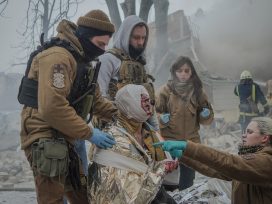
Under the aegis of the Council of Europe, a ‘core’ group of countries have been moving forward with plans for a tribunal capable of prosecuting the Russian leadership for the crime of international aggression. The US administration’s switch of allegiance now puts these plans at risk, writes Gwara Media.
